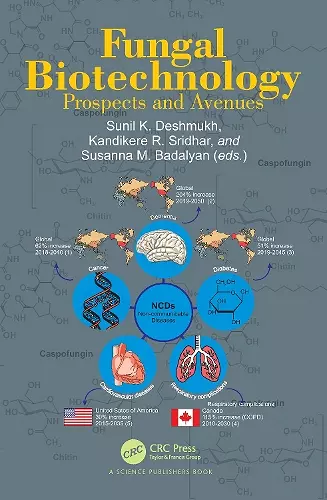Fungal Biotechnology
Prospects and Avenues
Kandikere R Sridhar editor Sunil K Deshmukh editor Susanna M Badalyan editor
Format:Hardback
Publisher:Taylor & Francis Ltd
Published:18th Aug '22
Currently unavailable, and unfortunately no date known when it will be back

Traditional studies in mycology mainly deal with damage caused by fungi, for instance, diseases of plants, animal ailments, air-borne pathogens, decomposition of wood and production of mycotoxins in food. Applied mycology focuses on the fermentation of foods (flours, bakery products, cheese and others) and production of fermented products (wine, beer and spirit). Further value-added approaches show the significance of fungi in the production of bioactive metabolites and pharmaceuticals used in the treatment of human diseases, including cancer, and plant diseases (e.g. pest control). Due to a dependence on fossil resources, production of bio-renewable merchandise gained importance and fungi serve as potential biological agents in sustaining global economy. Recent developments in mycology revealed their significance in the fields of advanced research, in particular building materials, packaging resources, electronic devises and leather-like goods. In addition, fungi possess several qualities to degrade non-biodegradable compounds in the ecosystem and assist in sustainable waste bioremediation.
This bookcovers the current biotechnological advances and bio-prospect potential of fungi. Fungal biopolymers possess various applications, including prebiotics, therapeutics, immunoceuticals, drug-discovery and drug-delivery. Fungal bioactive metabolites have several implications beyond antibiotics, such as volatiles, biofuels, nematicides and pigments. They also serve as prospective tools in the production of nanoparticles of medicinal, nutritional and industrial significance. In view of environmental protection, fungal activity and products aid in bioremediation via degradation of xenobiotics and solid wastes. Fungi can produce agriculturally compatible metabolites to enhance plant production. Knowledge on fungal genomics facilitates the gene manipulation towards biotechnological applications (disease diagnosis, pathogen detection, gene expression and mutualistic interactions). This book addresses the application of fungi in different areas and serves as a potential knowledge bank for graduates, post-graduates and researchers contemplating fungal applications.
ISBN: 9781032163857
Dimensions: unknown
Weight: 990g
440 pages